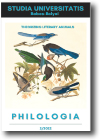CAN THE NON-HUMAN SUBALTERN SPEAK? ADDRESSING INJUSTICE THROUGH PARAKEETS, PENGUINS AND BLUE MACAWS
CAN THE NON-HUMAN SUBALTERN SPEAK? ADDRESSING INJUSTICE THROUGH PARAKEETS, PENGUINS AND BLUE MACAWS
Author(s): Sutirtho RoySubject(s): Semiotics / Semiology, Comparative Study of Literature, Other Language Literature, Translation Studies, Theory of Literature, American Literature
Published by: Studia Universitatis Babes-Bolyai
Keywords: eco-criticism; linguistic; environmental; post-humanism; post-anthropocentrism; non-human; critical animal studies; semiotic; contact zone;
Summary/Abstract: Can the Non-Human Subaltern Speak? Addressing Injustice through Parakeets, Penguins and Blue Macaws. Anthropomorphic animals have formed a staple part of the human imagination across space and time, creating a liminal space that offers scope for eco-critical narratives in which anthropomorphic animals offer a counter-gaze to human activities and environmental injustice. The purpose of this study is to look at the characters of Rio, Happy Feet, and Delhi Safari to highlight how talking animals in each of the three animated films voice environmental concerns, and to delineate linguistic factors which regulate the dynamics of power, agency, and care. The article looks at Delhi Safari, which centres on the non-humans’ use of the human tongue to voice their woes before human authority. At the same time, it aims to delineate human attempts to talk to birds in Rio and delve into the very idea of endangered animals being companion species. It seeks to shift from linguistic modes of communication to analyse the narrative and meta-narrative messages conveyed through the dancing penguins of Happy Feet. Finally, the article hopes to address the use and misuse of care by both humans and non-humans, look at the implicit anthropocentrism in such a depiction, and consider the possibility of a truly post-human form of environmental ethics.
Journal: Studia Universitatis Babes-Bolyai - Philologia
- Issue Year: 67/2022
- Issue No: 2
- Page Range: 227-250
- Page Count: 24
- Language: English

